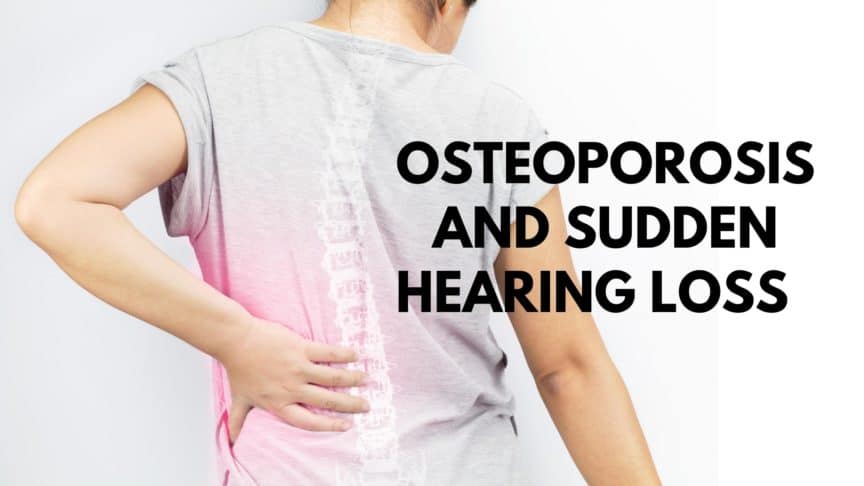Did you know that your bones have the ability to actually replenish themselves throughout our lifetime? However, osteoporosis slows this process down creating weakened bones that are more vulnerable to breakage.
Osteoporosis is a disease in which bones become more vulnerable to damage and breaks. The International Osteoporosis Foundation projects that this condition affects approximately 200 million people worldwide. It is estimated that 1 in 3 women over the age of 50 years and 1 in 5 men will most likely experience osteoporotic fractures within their lifetime. This disease is alarming not only because it puts your bones at risk but because it is often connected to another serious health condition – Sudden Sensorineural Hearing Loss.
Causes of Osteoporosis
Throughout a lifetime new bone is made and old bone is broken down. When people are young most bodies can replenish bones faster, increasing bone mass and strength. However, after the early 20s this process slows, and most each peak bone mass by age 30. As people age, bone mass is lost faster than it’s created. The higher your peak bone mass, the less likely you are to develop osteoporosis as you age. Some risks around this condition are unchangeable such as genealogy however there are lifestyle changes that can prevent or slow the breakdown of bone. Some of these habits include regular excessive, a balanced diet rich in calcium, vitamin D and proteins, and avoiding tobacco and excessive alcohol consumption.
Sudden Sensorineural Hearing Loss
Despite the name, sudden hearing loss doesn’t always happen all at once. It usually takes about 72 hours to set in. Sensorineural hearing loss occurs when the cells of the inner ear, responsible for communicating sound to the brain become damaged. Nine out of 10 people experience sudden hearing loss in just one ear. Most can still hear in the affected ear, but it may sound muffled or quieter like people speaking to you in normal volumes may be registered as a whisper. If this happens to you it is important not to ignore it as it could be a sign or a more serious condition. Some common causes of sudden sensorineural hearing loss include a blockage of earwax or debris, autoimmune diseases, bacteria, head trauma or exposure to loud noise.
Studying the Connection Between Sudden Hearing Loss and Osteoporosis
While evidence is still being collected many doctors and researchers suspect that osteoporosis and sudden hearing loss are connected. A 2015 study from Taiwan collected data in which to quantify the risk of sudden hearing loss in patients with osteoporosis. Using information collected from a national health database, a team led by Dr. Kai-Jen Tien at the Chi Mei Medical Center in Tainan City, compared 10,000 people diagnosed with osteoporosis between 1999 and 2008 to 32,000 people who did deal with the condition. Dr. Kai-Jen Tien’s team found that the risk of sudden sensorineural hearing loss was 1.76-fold compared to patients who were not diagnosed with osteoporosis. They also identified that the patients who seemed to be most at risk were women over 50 who had high blood pressure in conjunction with osteoporosis. The study confirms a relationship between these two very serious conditions. Some theories around the connection include cardiovascular or cerebrovascular involvement, bone demineralization, inflammation and a breakdown of blood vessel cell walls.
What Can You Do to Protect Your Ears and Your Bones?
While the connection between the two conditions is still unconfirmed, the possibility that osteoporosis raises the risk of sudden sensorineural hearing loss should not be ignored. If you have been diagnosed with osteoporosis, careful attention should be paid to their hearing health. “Clinicians should not ignore hearing problems in osteoporotic patients.
Likewise, patients with osteoporosis should be aware and inform their clinician if they suffer from suspected hearing impairment,” said Dr. Kai-Jen Tien. Despite many cases of sudden hearing loss returning to normal, cases in which sensorineural hearing loss are concerned are almost always permanent. While no preventative sensorineural hearing loss treatments for patients with osteoporosis have been identified, it is important to be aware that your hearing could be at risk.
Make sure to have your hearing tested annually. If there is a problem, we can help you find solutions to deal with your hearing loss. Contact us today!

